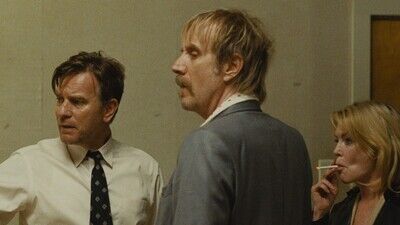After the forced bursts of energy, nightmarish dream sequences, and a strained bit of self-absolution recede, you soon realize that writer/director Niclas Larsson’s “Mother, Couch,” a morose, nonsensical family drama is about as interesting as the lint between the cushions. “Mother Couch” draws from several wells. Taking place mostly in this larger-than-expected furniture store, the film utilizes a combination of the building’s myriad showrooms as one continuous liminal space whose ambiguous temporality recalls Charlie Kauffman’s penchant for wielding mundane settings to interrogate hidden anxieties. The type of escalating deadpan absurdity that is reminiscent of Roy Andersson is also present. But more than any filmmaker, the entire film suggests Paul Thomas Anderson. From the setting of a furniture store that seems to exist at the end of the world to the franticness of Dave, you can’t help but feel “Punch-Drunk Love.”
Unlike PTA’s oddball rom-com, however, “Mother Couch” lacks a soul, or at least one worth investing in. From his uneasy relationship with his soon-to-be ex-wife Linda (Lake Bell) to how often he forgets to care for his young daughter, Dave isn’t terribly likable. This isn’t necessarily a bad thing; Kauffman’s work, for instance, routinely features aloof, self-absorbed people dealing with their own psychological shit. But Dave, who is similarly parsing his past, is too passive, shallow, and boring to make you interested in this world, its actions, its characters, or him. The camera also lacks a point of view. For much of the movie, we’re never quite sure if the film is about Dave or if he happens to be the most interesting person among this lifeless lot.
The script similarly plays hard-to-get. Originally based on Jerker Virdborg’s Swedish novel Mamma i soffa, Larsson changed and re-tooled much of that story’s content—those alterations are apparent. For much of “Mother Couch,” Dave’s motivations are ambiguous. Larsson further leans on the couch as a heavy metaphor for the inability to process and move on. We discover that Dave’s mother wasn’t the best mom, having children with three different men (hence McGregor, Ifans, and Boyle, each playing a sibling, confusingly having different accents). We also learn that his mother kept the letters Dave wrote to his siblings; he had hoped to use these missives to get to know his brother and sister.

